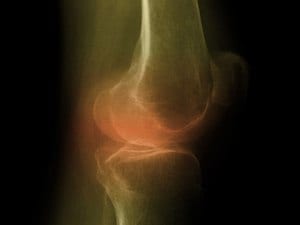
MONDAY, June 18, 2018 (HealthDay News) — Many aging Americans are both overweight and burdened by arthritis of the knees.
New research shows that shedding those excess pounds can mean shedding joint pain, too.
“This study adds to the evidence that weight loss is one of the few truly effective nonsurgical measures to reduce pain and improve function in overweight patients with knee osteoarthritis,” noted Dr. Matthew Hepinstall, a joint specialist who wasn’t involved in the new research.
“As an orthopedic surgeon treating several hundred patients per year with knee osteoarthritis, I see the detrimental effects of excess body weight on a daily basis,” said Hepinstall, associate director of the Center for Joint Preservation & Reconstruction at Lenox Hill Hospital in New York City.
It’s estimated that more than 250 million adults worldwide have knee osteoarthritis, a gradual deterioration of the joint. The new study was led by Stephen Messier of Wake Forest University and published June 18 in Arthritis Care & Research.
In earlier research, Messier’s team found that weight loss of 10 percent or more over 18 months led to a 50 percent reduction in pain and significant improvements in mobility for people with arthritic knees.
The new study found greater weight loss led to better outcomes for those overweight or obese patients with knee osteoarthritis. In analyzing the data on 240 such patients, the researchers report that a weight loss of 20 percent or more led to an additional 25 percent reduction in pain. The patients also had continued improvements in physical function, compared to people who dropped only 10 percent of their weight over the study period.
The more weight the person lost, the better they fared in terms of discomfort, overall function, the distance they were able to walk in six minutes, and their physical and mental health-related quality of life. Two measurements of knee health — joint compression force and levels of an inflammatory marker called IL-6 — also improved as patients shed excess pounds.
“A 10 percent weight loss is the established target recommended by the National Institutes of Health as an initial weight loss for overweight and obese adults,” Messier noted in a journal news release. “The importance of our study is that a weight loss of 20 percent or greater — double the previous standard — results in better clinical outcomes, and is achievable without surgical or pharmacologic intervention.”
Hepinstall acknowledged that “weight loss is easy for physicians to recommend but hard for patients to accomplish.”
He added, “This study reinforces the message that the typical results of weight loss are beneficial enough to justify the effort required in patients with knee osteoarthritis.”
More information
The American Academy of Family Physicians has more on knee osteoarthritis.
